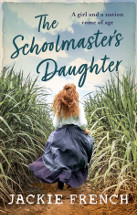The Schoolmaster's Daughter by Jackie French

Angus & Robertson, 2020. ISBN: 9781460757710.
(Ages: 12+). Highly recommended. Author Jackie French has cleverly
used relevant facts from her own family history in the writing of The
Schoolmaster's Daughter. The story is set in 1901 where
changes were happening in White Australia's young history. Hannah
and her family have arrived at Port Harris ready for her father to
take up his post of Headmaster. Sadly their arrival was marred by
their ship being stuck on a sandbar for a number of days. After
escaping to the beach the ship sinks with all of their possessions
and the women and two children are left alone while the men search
for help. They are rescued by Jamie, a young teenager of mixed race,
who takes them home to his white mother Mrs Zebediah who feeds and
comforts the women. Jamie and his mother are ostracised by the
community but play a significant and pivotal role in Hannah's story.
Hannah has finished her primary schooling but her father does not
allow her to continue her education nor will he educate Jamie.
Hannah's disfigured but her outspoken suffragette and financially
independent mother has other ideas and secretly educates Hannah and
Jamie at the Zebediah farm. In 1901 this is scandalous and if
discovered would mean social isolation for Hannah's family and
terrible danger for Jamie and his mother. The local plantation owner
employs Pacific Islander people to work in his cane fields in
brutally shocking conditions akin to what we know of slavery in the
United States.
The Schoolmaster's Daughter has so many important historical
facts for consideration: the conditions married women endured, lack
of education for girls after primary school, the White Australia
Policy as well as the mistreatment of the cane workers, all
interwoven in a compelling and absorbing story. The historical facts
Jackie French weaves into her stories allows the reader to gain
valuable insight into Australia's complex and turbulent growth as a
nation. Themes: Family Life, Australian History, Relationships,
1900's, Women's Issues, Cane Plantations, Slavery, Racism.
Kathryn Beilby